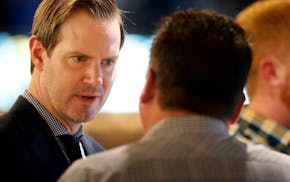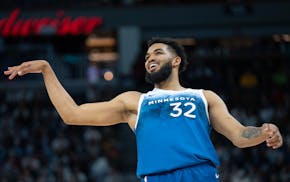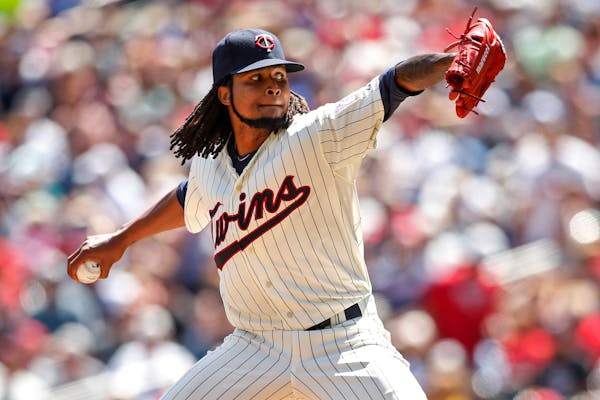The Gophers won a battle of unbeatens with Iowa, 27-10, on Nov. 5, 1960, at Memorial Stadium and moved to No. 1 in the national wire service polls. One week later, a Purdue team with a 2-4-1 record came to Minneapolis and upset the Gophers 23-14.
Bernie Allen was the quarterback on that Purdue team. He also kicked a crucial field goal, punted and played in the secondary.
The visitors had arrived for the game in three DC-3s that were part of the Purdue fleet. On the way home, there was a mechanical fire in the plane on which Allen was traveling and the plane made an emergency landing in Madison, Wis.
Was there any thought that sabotage had taken place by unhappy Gophers followers?
Allen laughed and said: "Actually, when I was walking to a team bus after the game, a group of Minnesota fans came up to me and said, 'We're disappointed that the Gophers lost, but you and your teammates played better than we did today. You deserved to win. Congratulations.'
"I thought, 'I've never seen fans like this.'
"That was one reason I signed with the Twins. I remembered the Gophers fans and felt Minnesota was a place that I could be comfortable."
Allen was an outstanding shortstop for Purdue as well as the football quarterback. There was not yet a baseball draft and teams bid for players with signing bonuses. The "bonus baby" rule causing high bonus players to spend their first two seasons in the major leagues was no longer in effect in 1961.
"I could have been the first bonus baby for the New York Mets," Allen said. "They offered me $100,000 — twice as much as the Twins — but I was a quiet kid then and New York scared the hell out of me."
Allen took owner Calvin Griffith's $50,000 bonus and played 80 games that summer for Charlotte, a farm club in the Class A Sally League.
It was the Twins' first season in Minnesota and second base was a trouble spot. The Twins started with Billy Gardner, tried Ted Lepcio and on June 1, they sent utility infielder Billy Consolo to the Milwaukee Braves for Billy Martin.
A half-dozen years later, Griffith famously ordered manager Sam Mele to start the season with Rod Carew, a player with little minor league experience, to open the 1967 season at second base.
The situation with Allen in 1962 can be looked at as a precursor to the Carew situation. Allen came to spring training in Orlando and displayed the young man's skills that Martin had long ago lost. Martin was released and Allen was named as the starter right before the opener.
A lefthanded hitter, Allen played in 159 games, batted .269 with 12 home runs and 64 RBI, and received one of the 20 votes (there were only first-place votes) for Rookie of the Year in the American League.
Allen, now 76 and living in Carmel, Ind., will be among the 20 players expected to participate in this weekend's 50th anniversary celebration at Target Field for the Twins' 1965 World Series team.
Allen was part of that team as it developed into an American League champion, but one play changed him from Zoilo Versalles' regular double-play partner and put him on the fringe of the '65 club.
On June 13, 1964, the Twins were playing the Senators in Washington. "I was covering second and stretching out for a throw from Zoilo, like a first baseman, to get a forceout,'' Allen said. "My left knee was exposed and Don Zimmer came into me with a rolling block."
Dirty play?
"I might be looked at that way today," Allen said. "Back then, it's the way you played."
Every ligament in Allen's left knee was torn. He actually came back on Aug. 4 and hobbled around trying to play for a month.
"I went to Dr. [Donald] Lannin from the Vikings and he wouldn't operate," Allen said. "He said there was no way I would play again.
"I heard about a doctor in Oklahoma, Don O'Donoghue, and he used me for an experiment.
"He took my hamstring, moved it down by my knee, wound it through my knee and said, 'There's a 50-50 chance you'll be able to play some sports again. But there's a zero chance you'll play baseball.'
"I played nine more years. When I tell other doctors that Dr. O'Donoghue did my knee, they will say, 'The Guru. He was the guru of knee surgery.' "
Griffith thought the radical knee surgery was hocus-pocus and didn't want to pay the $2,000 for the surgery.
"He had to pay, though, so he just cut my salary by $2,000 for the 1965 season,'' Allen said. "I liked everything about Minnesota except Calvin. In fact, he's the reason I was a player representative later in my career. I was there for Marvin Miller's first union meeting."
Sweet revenge on Calvin, being one of Marvin's guys.
Allen's balky knee allowed him to play only 15 games for the Twins (and 41 for Class AAA Denver) in 1965. He was traded after the 1966 season along with Camilo Pascual to Washington for reliever Ron Kline.
"Those were my friends — the guys I played with — and it was great to see them in the World Series," Allen said. "It will be a good weekend."
Footnote: The 1960 Gophers closed with a drubbing of Wisconsin, No. 1 Missouri was upset by Kansas and, in the final wire service polls released then at the end of the regular season, Minnesota was declared the national champion.
Patrick Reusse can be heard 3-6 p.m. weekdays on AM-1500. • preusse@startribune.com

Reusse: Success on court helped Timberwolves do strong business

Reusse: Taylor's story. 'I just bought the Minnesota Timberwolves.'

Reusse: Back from injury, Towns doesn't have to carry load


